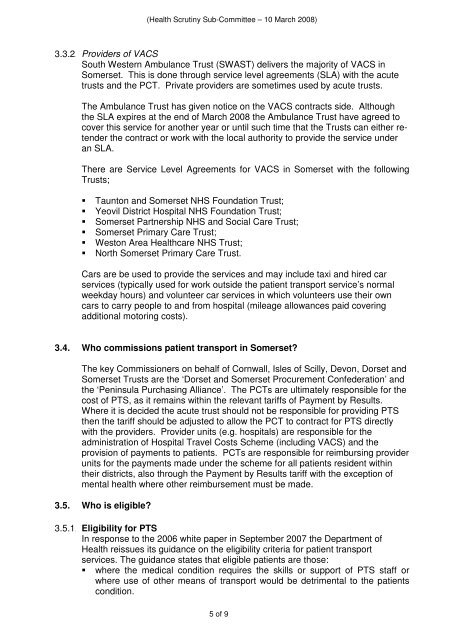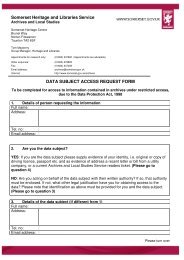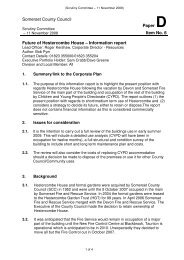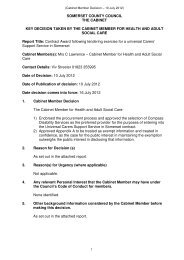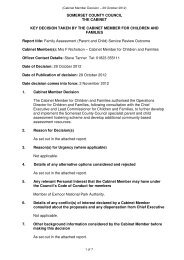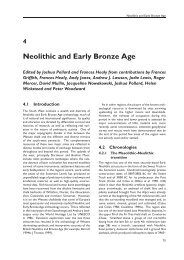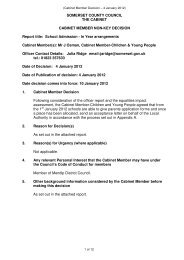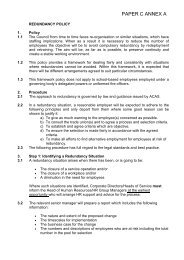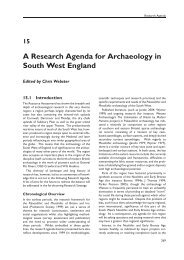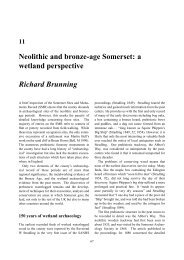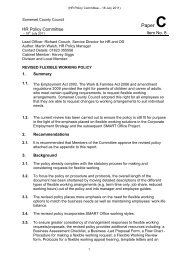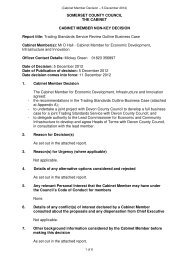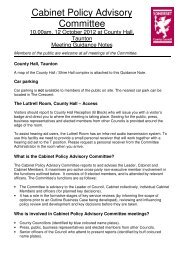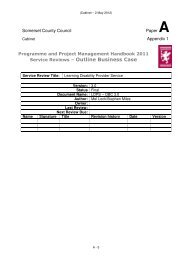Non-Emergency Transport for Health Patients in Somerset
Non-Emergency Transport for Health Patients in Somerset
Non-Emergency Transport for Health Patients in Somerset
- No tags were found...
You also want an ePaper? Increase the reach of your titles
YUMPU automatically turns print PDFs into web optimized ePapers that Google loves.
(<strong>Health</strong> Scrut<strong>in</strong>y Sub-Committee – 10 March 2008)3.3.2. Providers of VACSSouth Western Ambulance Trust (SWAST) delivers the majority of VACS <strong>in</strong><strong>Somerset</strong>. This is done through service level agreements (SLA) with the acutetrusts and the PCT. Private providers are sometimes used by acute trusts.The Ambulance Trust has given notice on the VACS contracts side. Althoughthe SLA expires at the end of March 2008 the Ambulance Trust have agreed tocover this service <strong>for</strong> another year or until such time that the Trusts can either retenderthe contract or work with the local authority to provide the service underan SLA.There are Service Level Agreements <strong>for</strong> VACS <strong>in</strong> <strong>Somerset</strong> with the follow<strong>in</strong>gTrusts;Taunton and <strong>Somerset</strong> NHS Foundation Trust;Yeovil District Hospital NHS Foundation Trust;<strong>Somerset</strong> Partnership NHS and Social Care Trust;<strong>Somerset</strong> Primary Care Trust;Weston Area <strong>Health</strong>care NHS Trust;North <strong>Somerset</strong> Primary Care Trust.Cars are be used to provide the services and may <strong>in</strong>clude taxi and hired carservices (typically used <strong>for</strong> work outside the patient transport service’s normalweekday hours) and volunteer car services <strong>in</strong> which volunteers use their owncars to carry people to and from hospital (mileage allowances paid cover<strong>in</strong>gadditional motor<strong>in</strong>g costs).3.4. Who commissions patient transport <strong>in</strong> <strong>Somerset</strong>?The key Commissioners on behalf of Cornwall, Isles of Scilly, Devon, Dorset and<strong>Somerset</strong> Trusts are the ‘Dorset and <strong>Somerset</strong> Procurement Confederation’ andthe ‘Pen<strong>in</strong>sula Purchas<strong>in</strong>g Alliance’. The PCTs are ultimately responsible <strong>for</strong> thecost of PTS, as it rema<strong>in</strong>s with<strong>in</strong> the relevant tariffs of Payment by Results.Where it is decided the acute trust should not be responsible <strong>for</strong> provid<strong>in</strong>g PTSthen the tariff should be adjusted to allow the PCT to contract <strong>for</strong> PTS directlywith the providers. Provider units (e.g. hospitals) are responsible <strong>for</strong> theadm<strong>in</strong>istration of Hospital Travel Costs Scheme (<strong>in</strong>clud<strong>in</strong>g VACS) and theprovision of payments to patients. PCTs are responsible <strong>for</strong> reimburs<strong>in</strong>g providerunits <strong>for</strong> the payments made under the scheme <strong>for</strong> all patients resident with<strong>in</strong>their districts, also through the Payment by Results tariff with the exception ofmental health where other reimbursement must be made.3.5. Who is eligible?3.5.1. Eligibility <strong>for</strong> PTSIn response to the 2006 white paper <strong>in</strong> September 2007 the Department of<strong>Health</strong> reissues its guidance on the eligibility criteria <strong>for</strong> patient transportservices. The guidance states that eligible patients are those: where the medical condition requires the skills or support of PTS staff orwhere use of other means of transport would be detrimental to the patientscondition.5 of 9


